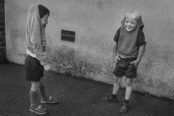[dropcap style=”font-size:100px; color:#992211;”]W[/dropcap]hat’s that you say?
Outsourcing the entirety of your ethical values to millennia-old writings and the arbitrary dogma of self-appointed moral custodians lessens your capacity for independent acts of goodwill and makes you more likely to judge and punish others?
Well golly gee, who’da thunk it!
Many families believe religion plays an essential role in childhood moral development. But children of religious parents may not be as altruistic as those parents think, according to a new international study from the University of Chicago published Nov. 5 in Current Biology.
A team of developmental psychologists led by Prof. Jean Decety examined the perceptions and behavior of children in six countries. The study assessed the children’s tendency to share–a measure of their altruism–and their inclination to judge and punish others for bad behavior.
Children from religious families were less likely to share with others than were children from non-religious families. A religious upbringing also was associated with more punitive tendencies in response to anti-social behavior.
The results were at odds with the perceptions of religious parents, who were more likely than non-religious parents to report that their children had a high degree of empathy and sensitivity to the plight of others.
“Our findings contradict the common-sense and popular assumption that children from religious households are more altruistic and kind toward others. In our study, kids from atheist and non-religious families were, in fact, more generous,” said Decety, the Irving B. Harris Distinguished Service Professor in Psychology and Psychiatry and the College and director of the University of Chicago Child NeuroSuite.
The study included 1,170 children between ages 5 and 12, from six countries–Canada, China, Jordan, South Africa, Turkey and the United States.
For the altruism task, children participated in a version of the “Dictator Game,” in which they were given 10 stickers and provided an opportunity to share them with another unseen child. Altruism was measured by the average number of stickers shared.
For the moral sensitivity task, children watched short animations in which one character pushes or bumps another, either accidentally or purposefully. After seeing each situation, children were asked about how mean the behavior was and the amount of punishment the character deserved.
Parents completed questionnaires about their religious beliefs and practices and perceptions of their children’s empathy and sensitivity to justice. From the questionnaires, three large groupings were established: Christian, Muslim and not religious. (Children from other religious households did not reach a large enough sample size to be included in additional analyses.)
Consistent with previous studies, in general the children were more likely to share as they got older. But children from households identifying as Christian and Muslim were significantly less likely than children from non-religious households to share their stickers. The negative relation between religiosity and altruism grew stronger with age; children with a longer experience of religion in the household were the least likely to share.
Children from religious households favored stronger punishments for anti-social behavior and judged such behavior more harshly than non-religious children. These results support previous studies of adults, which have found religiousness is linked with punitive attitudes toward interpersonal offenses.
“Together, these results reveal the similarity across countries in how religion negatively influences children’s altruism. They challenge the view that religiosity facilitates prosocial behavior, and call into question whether religion is vital for moral development–suggesting the secularization of moral discourse does not reduce human kindness. In fact, it does just the opposite,” Decety said.
Source: Eurekalert/University of Chicago
Image: Dan Booth. Not the be reproduced without express prior permission. Fire photo by Janutskas.

Some of the news that we find inspiring, diverting, wrong or so very right.




















